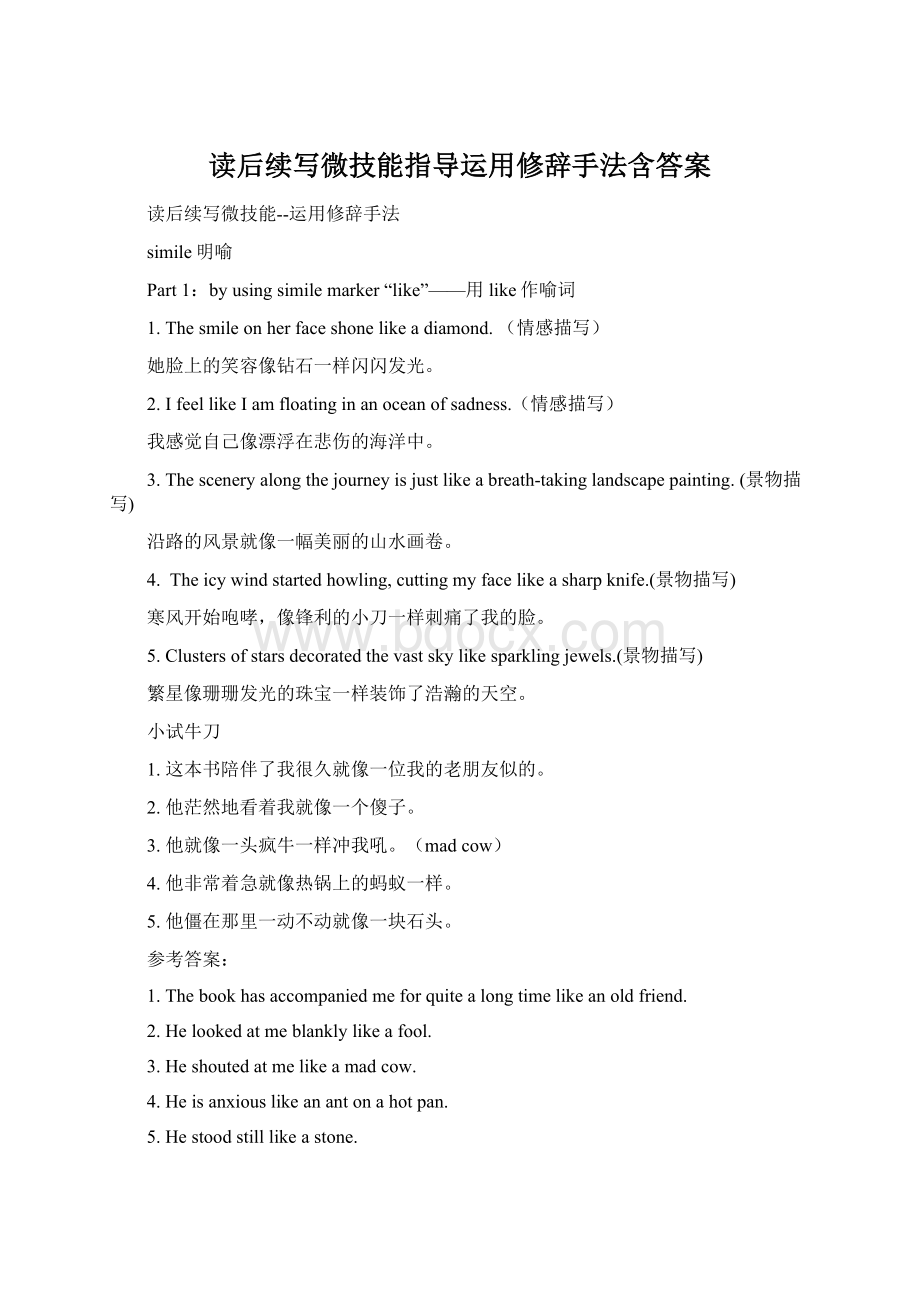读后续写微技能指导运用修辞手法含答案.docx
《读后续写微技能指导运用修辞手法含答案.docx》由会员分享,可在线阅读,更多相关《读后续写微技能指导运用修辞手法含答案.docx(9页珍藏版)》请在冰豆网上搜索。

读后续写微技能指导运用修辞手法含答案
读后续写微技能--运用修辞手法
simile明喻
Part1:
byusingsimilemarker “like”——用like作喻词
1.Thesmileonherfaceshonelikeadiamond. (情感描写)
她脸上的笑容像钻石一样闪闪发光。
2.IfeellikeIamfloatinginanoceanofsadness.(情感描写)
我感觉自己像漂浮在悲伤的海洋中。
3.Thesceneryalongthejourneyisjustlikeabreath-takinglandscapepainting.(景物描写)
沿路的风景就像一幅美丽的山水画卷。
4. Theicywindstartedhowling,cuttingmyfacelikeasharpknife.(景物描写)
寒风开始咆哮,像锋利的小刀一样刺痛了我的脸。
5.Clustersofstarsdecoratedthevastskylikesparklingjewels.(景物描写)
繁星像珊珊发光的珠宝一样装饰了浩瀚的天空。
小试牛刀
1. 这本书陪伴了我很久就像一位我的老朋友似的。
2. 他茫然地看着我就像一个傻子。
3. 他就像一头疯牛一样冲我吼。
(madcow)
4. 他非常着急就像热锅上的蚂蚁一样。
5. 他僵在那里一动不动就像一块石头。
参考答案:
1.Thebookhasaccompaniedmeforquitealongtimelikeanoldfriend.
2.Helookedatmeblanklylikeafool.
3.Heshoutedatmelikeamadcow.
4.Heisanxiouslikeanantonahotpan.
5.Hestoodstilllikeastone.
Part2:
byusingsimilemarker “as...as”——用as..as作喻词
1.Thesmileonherfacewasasvibrantasthesunonasummerday(情感描写)
她脸上的笑容和夏天的太阳一样充满活力。
2.Fatherrushedtohisson'sschool,onlytodiscoverthebuildingwasasflataspancake煎饼.(景物描写)
父亲冲到儿子的学校后,才发现这座建筑已经变成一片废墟。
3.Ireachedouttotouchherface,whichwasascoldastheice.(人物描写)
我伸手去摸她的脸,发现她的脸像冰一样冰冷。
更多搭配:
asbusyasabee 忙忙碌碌
ashungryasawolf 饥肠辘辘
asproudasapeacock 傲如孔雀
asbraveasalion 勇猛如狮
asprettyasapicture 美如画
小试牛刀
1. 我的心和蜂蜜一样甜。
2. 他的心和石头一样硬。
3. 他的身体和牛一样壮实。
4. 我们面前的景色美如一幅画。
5. 这辆公交车走的像蜗牛一样慢。
参考答案:
1.Myheartisassweetashoney.
2.Hisheartisashardasastone.
3.Hisbodyisasstrongasacow.
4.Thescenerybeforeusisasbeautifulasapicture.
5.Thebuswentasslowlyasasnail.
Part3:
byusingsimilemarker “asif”——用asif作喻词
1.MrsSatherlookedatmyeyesasif(shewere)seeingmyinnerselflockedawayinside. (动作描写)
Sather老师看着我的眼睛,仿佛看到了我灵魂深处封闭的自我。
2.Sheswepthersonintoherarmswithhereyeswetasifshewantedtosqueezethebreathoutofhim.(动作描写)
她眼睛湿润,把儿子拥进怀里,仿佛想把他的呼吸挤出来。
3.Herhairgrewgreyerandgreyer,asif(itwere)coveredwithsnowandfrost.
(肖像描写)
他的头发越来越白了,简直像盖了一头皑皑的霜雪。
4.Shefeltasifherhearthadbeenrippedfromherbody.(情感描写)
她感觉自己心好像从她的身体里被撕开了。
小试牛刀
1. 他感觉彷佛整个世界都崩塌了。
2. 他在操场上自由地奔跑彷佛他是一只快乐的小鸟。
3. 他无辜地看着我好像他什么都不知道似的。
4. 他感觉他的心脏被刀子捅了一刀。
(stab)
参考答案:
1.Hefelt asifthewholeworldhadfallenapartonhim.
2.Hewasrunningonthesoprtsfieldasifhewasahappybird.
3.Helookedatmeinnocentlyasifhedidn'tknowanything.
4.Hefeltasifhishearthadbeenstabbedbyaknife.
metaphor暗喻
Metaphor:
Itisafigureofspeechcontaininganimpliedcomparison,inwhichawordorphraseordinarilyandprimarilyusedofonethingisappliedtoanother.Unlikesimile,awordoraphrasethatcomparesonethingtoanother,usingthewordslikeoras.
暗喻是比喻修辞的一种,用一种事物比喻另一种事物,本体喻体都出现,中间常用喻词“是”等连接,有时不用喻词。
暗喻的典型形式为:
甲是乙,而不用like, as等喻词。
Moneysometimesisapoison.
钱有时候是一种毒药。
Part1:
byusingthelinkword “be”——通过be动词联系
1.Herhairwasaflowinggoldenriverstreamingdownhershoulders. (肖像描写)
她的头发像是一条流淌在她肩上的金色河流。
2.Thebeatutifulparkwasascentedcarpetofcolor.(景物描写)
美丽的公园就是一个芬芳的彩色地毯。
3.Stopbeingsuchababy.(人物描写)
别这么幼稚好不好。
4.Lifeisanunexploredriver.fulloftwistsandturns.(哲理)
生活就像一条未被涉足的河流,有各种曲折。
Part2:
byusingtheverbs——通过动词联系
1.Ifeltalumpinmythroat,tearingwellingupinmyeyes.(情感描写)
我如鲠在喉,泪水湿润了眼眶。
2.Hedoesn'thaveanideaofhisown.Hejustparrotswhatotherpeoplesay.(人物描写)
他没有自己的观点,只会鹦鹉学舌。
3.Aheavysilenceblanketedtheroom.(环境描写)
整个房子沉浸在一片寂寞中。
4.Theboywolfeddownthefood.(动作描写)
小男孩狼吞虎咽。
找出下面句子里面的修辞
1.Myverythoughtwasliketheghostlyrustleofdeadleaves.
2.Helookedasifhehadjuststeppedoutofmybookoffairytales.
3.Windandrainnowwhipped(鞭打) thehouse.
参考答案:
1. 明喻 2.明喻 3. 暗喻
找出下面句子里面的修辞
1.Mymotherislikeacoatinwinter,offeringwarmthtome.
2.Thewindsoundedlikearoarofatrainpassingby.
3.Householdandmedicalsupliesstreamedinbyplane,train,truckandcar.
参考答案:
1. 明喻 2. 明喻 3. 暗喻
找出下面片段里面的修辞
Yesterday,Iwenttothepark.Irodemybicyclethroughtheevergreentreeswhichwereastallasskyscrapers.Thesunshonethrough clouds,whichwerefloatingpiecesofcottoncandyinthesky.Peplewerelaughingandenjoyingthecompanyoftheirfamiliesandfriends.Irodepastagiantgardenofbeautifulpink,yellowandpurpleflowers:
itwasascentedcarpetofcolor.Theparkislikeaoasis(绿洲)inthecity.
personification拟人
Personification拟人:
Itgiveshumanformoffeelingstoanimals,orleandpersonalattributes(赋予)toinanimate(无生命的)objects,ortoideasandabstractions(抽象).
Personification与汉语拟人完全相同,就是赋予物以人的语言属性。
这种拟人化的修辞手法读起来使人感到特别形象生动,富有情趣。
Part1:
把自然现象当作人来描写
1.Thewindstoodupandgaveashout.(景物描写)
大风凛冽,发出怒吼。
2.Thebreezegentlykissedhercheeks. (景物描写)
微风轻柔地亲吻着她的脸庞。
3.Thefeatherysnowflakesdancedinthenightair,makingabeautifulpicture.(景物描写)
鹅毛般的雪花在空中飞舞,像一幅美丽的图画。
4.Themistswallowedhimup.(景物描写)
薄雾把他包围起来。
5.Theicywindstartedhowling,stingingmyface.(景物描写)
寒风开始咆哮,刺痛了我的脸。
6.Starswinkedatmeinadarkeningsky.(景物描写)
夜空中星星向我眨眼睛。
7.Immediately,anabsolutedarknessruledtheforest.(景物描写)
顷刻间,黑暗统治了森林。
Part2:
把含蓄抽象的概念当作人来描写
1.Fearseized/swallowedhim.(情感描写)
恐惧把他吞噬了。
2.Angerchokedmywords.(情感描写)
我气得说不出话来。
3.Agoodideasuddenlystruckme.
我突然想到一个好主意。
4.Smiletookholdofhim.(情感描写)
他笑容满面。
5.Anxietytornhimintopieces.(情感描写)
她焦虑不安,十分崩溃。
6.Courage/Confidencedesertedhim.(情感描写)他没信心了。
7.Excitementdeprivedmeofallpowerofspeech.(情感描写)
我兴奋的啥也说不出来了。
Part3:
把动物当作人来描写
1.Inthedeadofnight,thecrickets蟋蟀 playedontheterraceofthehouse.
寂静的夜,蟋蟀旁若无人地在房子的阳台上玩。
(景物描写)
2.Birdsonthetreearesingingabeatifulsong.(景物描写)
树上的小鸟在树上唱着美妙的歌曲。
3.Thefrogsaregivingaconcert---mixedchorus.(景物描写)
青蛙在举办音乐会---混声大合唱。
4.Firefliespatrolthegrasswithsmalllanterns(景物描写)
萤火虫提着小灯笼在草丛中巡逻。
练习
1. 夏天的微风轻轻地抚摸着我的脸。
2. 细雨轻轻地亲吻着我的脸颊。
3. 我能听到到处都是鸟儿在歌唱。
4. 这个教堂目睹了这个城市20年的变化。
参考答案:
1.Thesummerbreezetouchedmyfacegently.
2.Thedrizzlekissedmeonmycheekgently.
3.Icouldhearbirdssingingeverywhere.
4.Thechurchhaswitnessedthecity'schangesinthepast20years.
hyperbole 夸张
Hyperbole:
Itisthedeliberateuseofoverstatementorunderstatementtoachieveemphasis.
夸张是比喻修辞的一种,是以言过其实的说法表达强调的目的,它可以加强语拾势,增加表达效果。
Part1:
使用数词或量词
1.Myheartbrokeinaboutamillionpieces.(情感描写)
我的心成了碎片。
2.Shewashalfdeadwithfear.(情感描写)
她吓得半死。
3.Thanksamillion.
非常感谢你。
4.I‘vetoldyouamilliontimes.
我都告诉你多少次了。
5.Thebackpackweighsaton.
背包很重。
Part2:
使用动词
1.Theyounggirlbroughtthehousedownwithherperfomance.
这位年轻姑娘的表演博得了满堂喝彩。
2.Itmademejumpoutofmyskin. (情感描写)
吓得我魂不附体。
3.Ialmostlaughedmyheadoff.(情感描写)
我都快笑死了。
4.Mybloodfroze.(情感描写)
我的血液都凝固了。
5.Shecriedhereyesout. (情感描写)
她痛哭涕流。
6.Itbroughtherheartintohermouth.(情感描写) 让她的心悬到了嗓子眼。
7.Myheartsankwhenheleft.(情感描写)当他离开时我心都碎了。
Part3:
使用形容词和副词
在日常对话中,人们常用形容词或者副词去修饰微不足道的事情,目的就是为了渲染一种气氛,强调某种意义的事情。
如副词:
extremely;awfully;terribly;perfectly;horribly等等
形容词:
miserable;horrible;splendid等等
例如:
It'sbeautiful,heavenlybeautiful.(景物描写)
那儿很漂亮,就像天堂那般漂亮。
Part4:
使用介词短语
1.Shewenthomeinafloodoftears.(情感描写)
她泪如泉涌地回家去了。
类似表达:
Sheshedfloodsoftears.
2.Whentheytoldthenews,Iwasoverthemoon/onthetopoftheworld.(情感描写)
当他们告诉我这个消息时,我乐不可支。
3.Hewasbentoutofshape(情感描写)
他非常生气(气到变形)
找出下面句子里面的修辞
1.Thewindwhispersinthetree.
2.Thenoisewasloudenoughtowakethedead.
3.Hisspeechbroughtthehousedown.
4.TheoldVenicefellasleepagain.
参考答案:
1.拟人 2. 夸张 3.夸张 4. 拟人
找出下面句子里面的修辞
1.Thesunbrokethroughthecloudsandjumpedoutofthesea.
2.Thebirdsdancedhappilyonthebranch.
3.Sheeatslikeabird.
参考答案:
1. 拟人 2. 拟人 3. 明喻
找出下面句子里面的修辞
1.Theloudmusicalmostdrovemeupawall.
2.Thenightgentlylaysherhandatourfeverdheads.
3.Thevolcanospitoutlavafromitsmouth.
4.Heisdyingforthisopportunity.
参考答案:
1. 夸张 2. 拟人 3. 拟人 4. 夸张